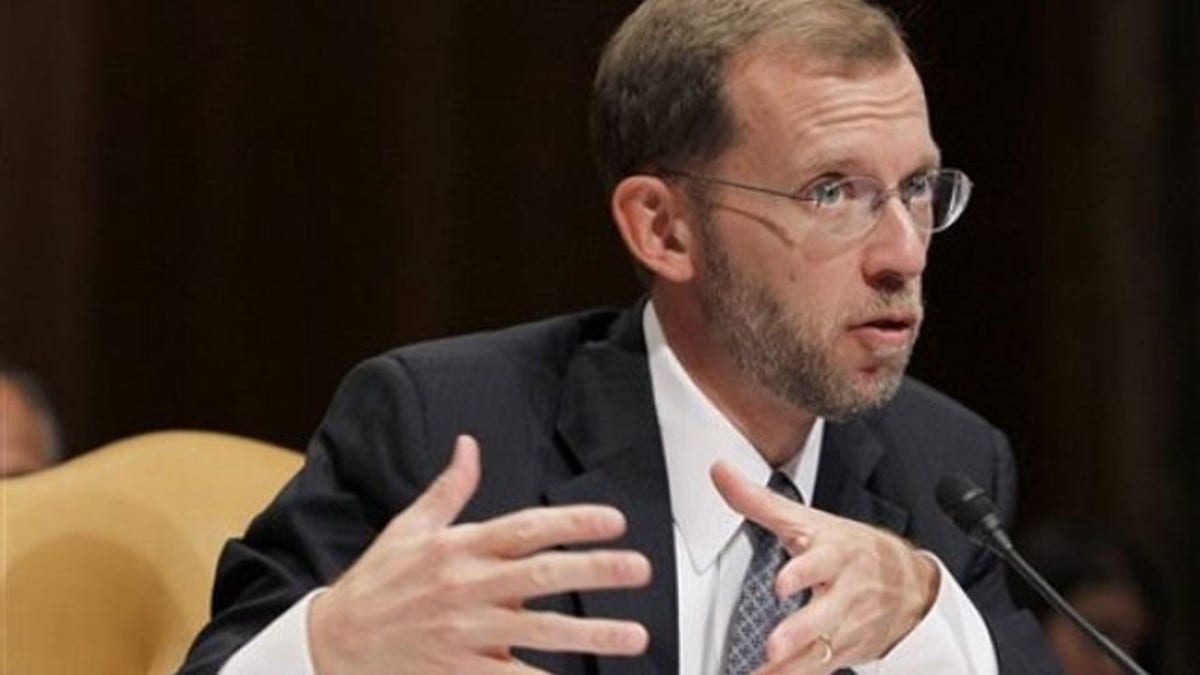
FILE: In this Sept. 28, 2010, photo, Congressional Budget Office Director Douglas Elmendorf testifies on Capitol Hill. (AP)
The top numbers cruncher for Congress warned Thursday that the federal government increasingly risks sending the country into a "fiscal crisis," projecting that unless cuts are made, within a decade the national debt could reach nearly 100 percent of all annual economic activity.
That's like having $50,000 in debt on a $50,000-a-year salary.
Congressional Budget Office Director Douglas Elmendorf, on the heels of a report pegging the 2011 budget deficit at a record $1.5 trillion, testified before the Senate Budget Committee on the risks of inaction. He said cumulative deficits over the next 10 years could run anywhere from $7 trillion to $12 trillion.
He warned that making budget cuts too deep, too fast could be "disruptive" to the economic recovery at a fragile time. But he said Congress will have to start balancing the budget soon if it wants to head off, or at least minimize, the chance of a national debt-driven fiscal calamity in the future.
"The longer that you wait to make those policy changes ... the greater the negative consequences (of the national debt) will be," he said.
Invoking recent economic crises in countries like Ireland and Greece, Elmendorf said waiting too long to curb spending and reduce the debt can have a host of consequences which all add up -- investors get nervous that the government can't finance its debt; the government loses the ability to respond to emergencies while interest rates eat up more and more of the budget pie; and taxes rise.
As is customary in congressional hearings about the nation's fiscal problems, Elmendorf rattled off a string of staggering numbers in his forecast of future budget shortfalls. He said that if nothing changes in the law, the federal deficit will add up to $7 trillion over the next decade, pushing the debt up to 77 percent of GDP. But he suggested that estimate "understates" the problem, given that lawmakers frequently extend policies, like tax cuts and higher Medicare payments to doctors, that would help balance the budget if they were allowed to expire.
If such short-term policies are extended, Elmendorf said, the deficit would reach nearly $12 trillion over the decade, pushing the debt to almost 100 percent of GDP.
The hearing comes after the Congressional Budget Office released a report that shows the nation's red ink running even deeper than previously thought.
"Spending as a share of our national income is at the highest level in 60 years. Revenue as a share of our national income is at its lowest level in 60 years. No wonder that we are headed for the largest deficit ever," said committee chairman Kent Conrad, D-N.D.
The analysis showed the deficit hitting a record $1.5 trillion this year, charting a rise due in part to a lagging economic recovery coupled with the recently passed tax cut package.
The study also showed Social Security in a deficit this year. The entitlement program ran at a deficit in 2010 but had been expected to run in the black for a few more years before reverting back and permanently paying out more than it takes in. The latest estimate now shows Social Security consistently operating at a deficit through about 2037, when its reserves are expected to run out entirely.
President Obama touched on the need for deficit reduction in his State of the Union speech Tuesday. He called for a five-year freeze on non-mandatory domestic spending, a proposal he estimated would save $400 billion over the next decade. He called for action on reforming entitlements like Medicare, Medicaid and Social Security, without offering specifics.
But the $400 billion in proposed savings adds up to less than one-third of this year's projected deficit, and Republican congressional leaders roundly called on the administration to do more to address the nation's debt and deficit.
At the Budget Committee hearing, there was a bipartisan call for Congress to develop a spending-cut plan this year.
"We can't continue to put this off. We need to reach an agreement this year," Chairman Kent Conrad, D-N.D., said.
"The time for debate is over, and we must take action," said Sen. Mike Crapo, R-Idaho.











































